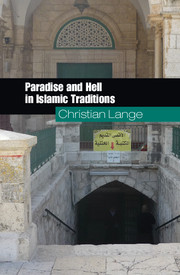Book contents
- Frontmatter
- Dedication
- Contents
- List of Figures
- List of Table and Charts
- Acknowledgements
- List of Abbreviations
- Note on Dates, Citation, Translations, and Transliteration
- Introduction
- Part I Textual Foundations: Narrating the Otherworld
- 1 The Otherworld Revealed: Paradise and Hell in the Qur'ān
- 2 The Growth of the Islamic Otherworld: A History of Muslim Traditionist Eschatology
- 3 Hope, Fear, and Entertainment: Parenetic and Popular Muslim Literature on the Otherworld
- 4 The Imagination Unbound: Two Late Medieval Muslim Scholars on Paradise and Hell
- Part II Discourses and Practices: Debating the Otherworld
- Epilogue
- Primary Sources
- Secondary Sources
- Index of Names
- Index of Terms
2 - The Growth of the Islamic Otherworld: A History of Muslim Traditionist Eschatology
from Part I - Textual Foundations: Narrating the Otherworld
Published online by Cambridge University Press: 05 December 2015
- Frontmatter
- Dedication
- Contents
- List of Figures
- List of Table and Charts
- Acknowledgements
- List of Abbreviations
- Note on Dates, Citation, Translations, and Transliteration
- Introduction
- Part I Textual Foundations: Narrating the Otherworld
- 1 The Otherworld Revealed: Paradise and Hell in the Qur'ān
- 2 The Growth of the Islamic Otherworld: A History of Muslim Traditionist Eschatology
- 3 Hope, Fear, and Entertainment: Parenetic and Popular Muslim Literature on the Otherworld
- 4 The Imagination Unbound: Two Late Medieval Muslim Scholars on Paradise and Hell
- Part II Discourses and Practices: Debating the Otherworld
- Epilogue
- Primary Sources
- Secondary Sources
- Index of Names
- Index of Terms
Summary
As rich as the Qurʾān is in eschatological ideas and images, it only provides the skeleton for the variegated body of texts that form the Islamic tradition of imagining paradise and hell. This chapter and the next trace the growth of this literature from the early centuries of Islam to the eve of modernity. Our concern will not be with the theological, philosophical, mystical, or esthetic responses to the evolving picture of paradise and hell, each of which will receive separate treatment in of this book. The aim of this and of the following chapter is, rather, to survey the development of Muslim narrative literature devoted to the otherworld, particularly as it took the form of collections of sayings (hadiths) attributed to the prophet Muḥammad and other early authorities. Of course, these collections cannot be defined by their narrativity alone, because they often pursue theological, philosophical, mystical, or esthetic agendas, too. Yet taken as a whole, these texts may well be said to constitute a distinct cluster of religious literature in Islam, and because the history of this body of literature has largely been ignored by scholars of Islam, it is worth describing it, noting its most important types, contributors, periods, and areas of flourishing.
The Formative Period (ca. First–Third/Seventh–Ninth Century)
The oldest stand-alone works devoted to collecting stories and hadiths about the otherworld date from the turn of the second to the third century of the Islamic era. Among the first specimen is that of the Baghdad littérateur, ʿAlī b. ʿUbayda al-Rayḥānī (d. ca. 219/834), a secretary to the ʿAbbāsid caliph al-Maʾmūn (r. 198–218/813–33). The title of al-Rayḥānī's work is What Paradise is like (Ṣifat al-janna). Scholars of the first two centuries of Islamic history, however, preceded al-Rayḥānī in gathering materials that expanded on the Qurʾānic picture of the otherworld, often adding significant new information. A keen interest in eschatological traditions is attributed to the Jewish convert and intimate of the caliph ʿUmar b. al-Khaṭṭāb (r. 13–23/634–44), Kaʿb al-Aḥbār (d. between 32/652 and 35/655), well known in later tradition for his knowledge of biblical literature. On more than one occasion, ʿUmar b. al-Khaṭṭāb would have asked Kaʿb to “make us afraid” (khawwifnā), a request to which Kaʿb responded by delivering graphic descriptions of hell to multitudes of enthralled listeners.
- Type
- Chapter
- Information
- Paradise and Hell in Islamic Traditions , pp. 71 - 92Publisher: Cambridge University PressPrint publication year: 2015



